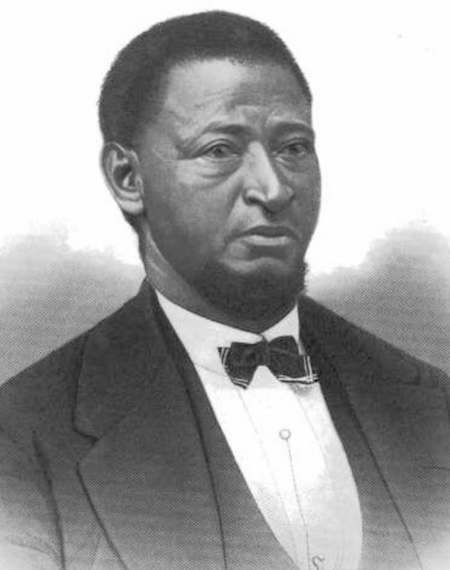This column by Daniel G. Clark first appeared in the Muscatine Journal. Dan says he is not related to Alex but is proud to claim him as “brother by another mother.”
February 25 is Alexander Clark Day in Muscatine.
In 2018 the city council unanimously affirmed that we will celebrate our famous resident’s 1826 birthday in perpetuity.
How convenient that our holiday comes during Black History Month!
School children all over Iowa learn the story of brave daughter Susan and the landmark 1868 Iowa Supreme Court decision upholding every child’s right to a public education. Iowans brag that it happened right here 86 years before the U.S. Supreme Court made education-equality the law of the land.
Recently I heard a whisper that the Clark story could be getting more traction these days if not so closely associated with the Democratic Party. Really?! Let us tell of his devotion to the party of Lincoln even when other Black leaders voiced second thoughts as Reconstruction came to an end.
From Clark’s centennial address (January 1876): “To this party and her heroic dead, you and I, and every American citizen, owe a lasting debt of gratitude for the liberty we now enjoy as a nation, and for the union of the states; and may it ever be said of the colored men of the republic that we will now be found standing in the ranks of the Republican party in defense of these great measures of justice and right.”
From a Chicago paper, reprinted in the Muscatine Journal (December 1876): “The Hon. Alexander Clark, the great colored orator of the State of Iowa, will deliver an address upon the Emancipation Proclamation of President Lincoln, on the evening of December 5, at Union Hall, corner Clark and Monroe streets.”
That was six years before our Iowa hero became the owner of Ferdinand Barnett’s Conservator, which he would publish until 1888. During those years he traveled widely and kept residences in both cities.
In January 1885 the nation had just elected the first Democratic president since the Civil War. By then a Chicago lawyer, Clark editorialized:
“Today we have no rights which either party desires to annul, nor have we a power of citizenship that both are not pledged to protect. Last year we were the wards of one party, the bane of the other; to-day both hold out to us an inviting hand, and both bid us come. We welcome the change. We want friendship and fair play. If the Democratic party, which christens the New Year with a pledge of ‘equal and exact justice to all,’ shall fulfill that pledge in both letter and spirit, this will indeed be a happy New Year. We hope it will. We want to feel free. Free in Georgia as in Maine; free in Texas as in Illinois. Our politics have not been questions of State, but matters of liberty and security. We have been Republicans because that party is the apostle of the one and the guardian of the other. The Democratic party comes in power. It promises us all the liberty that the constitution guarantees, and every element of security known to the laws. If these promises are kept, politics will no longer be the one thought of our lives. With the perfect freedom universally accorded, and absolute security unreservedly guaranteed, we shall be able to turn our powers to the up-building of our race. We shall save our money, till the earth, and educate our children. These are the needs of the race; these will we recognize. Thus shall the cloud of disappointment show to us a side bright with proffers of peace, assurances of friendship, prompting us to engage all our powers in the important matters of business, the accumulation of wealth, and the general enlightenment of the race.”
Later that year the Journal reprinted a Conservator article about “wealthy colored men.” Editor John Mahin, Clark’s ally since the 1850s, added that Clark is a fine example.
“We heard him say, years ago, that he foresaw in the early history of Muscatine that the lumber business would be profitable at this place and that he would have embarked in it but for the fact he knew that as a colored man many would through race prejudice refuse to patronize him except in some menial avocation. Nevertheless, Mr. Clark has, by industry and prudent management acquired quite a competency.”
In 1887 he chaired the executive committee of the National Colored Press Association and shared the rostrum with Ida B. Wells. She later moved to Chicago, married Barnett, and herself became editor of the Conservator. (Today the former Congress Parkway is Ida B. Wells Drive. Call that to mind whenever you drive under Chicago’s Old Main Post Office!)
Their party returned to power in 1888, President Benjamin Harrison awarded Clark one of the highest positions attained by any Black person of the century: Minister Resident/Consul General of the United States to Liberia.
There is so much more to be told about Muscatine’s part in Black History. One month is never enough.

